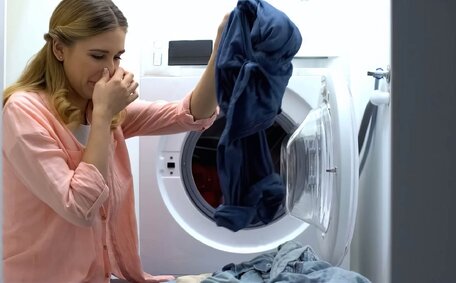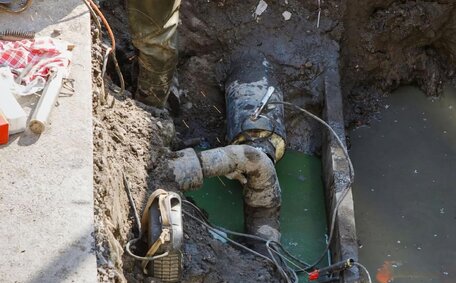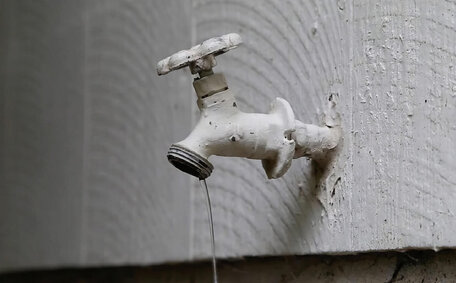Introduction to blocked drains: definitions and causes
A partially or fully clogged drain can disrupt your plumbing system, obstructing wastewater passage. This buildup of debris, sludge, grease, and water waste prevents the proper drainage from sinks, showers, bathtubs, washing machines, dishwashers, and toilets.
Several factors can result in blocked drains:
- Buildup of hair, other substances, and varied detritus travelling down your drains
- Tree roots growing into and damaging sewer line pipes
- Buildup of fats, oils, grease (FOG), which can damage pipes over time, hardening into blockages
- Collapsed or broken drain pipes allowing dirt and roots to enter
- Improper disposal of non-biodegradable items and other hard objects like wet wipes and sanitary products
Understanding the causes of clogged drains is crucial to maintaining your sewage system and avoiding expensive plumbing issues caused by inappropriate items washed down the drain.
Health hazards from sewage contamination
Blocked drains can cause sewage backups contaminated with bacteria, viruses, parasites, and other microorganisms found in human waste, posing significant health risks. The accumulation of sewage provides a fertile breeding ground for bacteria, posing significant health threats to your family and household.
Direct contact with sewage may cause health issues like gastrointestinal discomfort and flu-like symptoms, which threaten your health. More severe illnesses are also possible such as hepatitis A, cholera, dysentery, and gastroenteritis. Exposure to sewage can aggravate respiratory problems like asthma, further affecting your health.
When the drainage is blocked, the increased pressure could result in burst pipes, releasing potent fumes that similarly spark headaches, respiratory challenges, and widespread unease. Methane buildup, often created by these pests and bacteria, brings further risks of explosions and fires.
Ensure there is eye protection alongside waterproof gloves, boots, and masks when cleaning up sewage spills to prevent any direct contact. Air out the area so water cannot stagnate and meticulously clean the contaminated surfaces as this can result in a safer environment. If exposure leads to concerning symptoms, contact the department of health or your local physician immediately.
Ultimately, it’s crucial not to ignore blocked drains and to ensure they are serviced as soon possible, contacting a plumber soon, before complications worsen or structural damage sets in.
Spread of bacteria and infectious diseases
A blocked sewer creates the perfect conditions for bacteria, viruses, parasites, and other disease-causing organisms to thrive and spread. Clogged pipes can cause sewage to build up and become a reservoir for water contamination, fostering pathogens present in human waste.
Sewage carries bacteria such as E.coli, Salmonella, and Shigella, known to cause gastroenteritis. Viruses like hepatitis A, norovirus, and rotavirus can also propagate. Parasitic organisms like Giardia and Cryptosporidium spread through faecal contamination of water sources.
Microbes from corroded pipes due to standing water can contaminate the soil and invade your home, elevating the risk of infection. Overflowing drains dispatch pathogens to surfaces, affecting the expansive drainage areas in your home, dwelling on floors, walls, and fixtures.
To minimise health hazards, Act quickly when you notice warning signs like gurgling sounds or foul odours, suggesting it’s time for the task of unblocking drain. To prevent harm, avoid direct contact and do not let water down your drains without dispositives during the clean-up. Seek professional drain cleaning services to fully sterilise plumbing and prevent future blockages.
Overall, the health risks and unpleasant smell that blocked drains cause emphasise the need for regular plumbing maintenance and consultation with your local plumber. Practising safe disposal habits, using drain strainers, enzyme cleaners and regularly snaking your drain can help keep it free from hazardous clogs.
Hazards of Toxic Gases and Respiratory Concerns
Neglected drains can lead to a scenario where dangerous sewer gases like hydrogen sulphide, methane, and ammonia leak back into your property. Exposure to these toxic fumes is not only harmful to your health, with risks of headaches and nausea, but also brings the danger of explosions or fires.
Anaerobic bacteria flourish in large accumulations of organic refuse, potentially allowing toxic substances to seep back into stagnant water. Unchecked, their metabolic process can emit corrosive gases, damaging your plumbing.
Inhaling small amounts causes coughing, eye irritation, sore throat and dizziness. Higher concentrations trigger respiratory distress, chest pains, vomiting, and loss of consciousness. The elderly, children, pregnant women and those with existing conditions are most vulnerable.
Prevent the accumulation of toxic gases by regularly snaking drains and promptly addressing any gurgling or foul odours. Ensure proper venting allows gases to escape outdoors. Seek emergency assistance if you suspect sewer gas exposure before attempting to clear a drain yourself, due to explosion risks.
Gas blockages highlight the importance of regular maintenance and immediate action for plumbing system issues. Allowing sewage backups risks not only plumbing damage but the safety of everyone occupying a home.
Structural and property damage
A clogged drain can wreak havoc by overflowing or causing leaks, leading to floods in your home. This moisture allows mould and mildew to take hold, which can damage your home’s building materials, rot wooden structures, and ruin flooring or walls.
One study by the Insurance Institute for Business and Home Safety found up to 20% of water damage claims were due to leaks flooding homes from blocked drainage or sewer backups.
Overflowing sewage contaminates surfaces with harmful bacteria, presenting major risks to the drainage your home, as water your family comes into contact with can suffer effects on health and face significant clean-up challenges. Over time, even slow drainage from minor water leaks caused by pipe corrosion can weaken foundations, as no seal can fully protect critical supports.
These risks underscore the urgency of having severe blockages professionally cleared to safeguard water flow. Routine drain inspections and maintenance like pipe cleaning not only preserve the drainage your home health but also prevent leaks or collapses leading to costly repairs.
Letting seemingly minor issues persist prevents the opportunity to keep your drainage problems from spiralling. Proactivity diminishes long-term expenses and forestalls severe damage, like flooding or structural failures, necessitating extensive remediation.
When to call a professional plumber
It’s time to call professional help if you notice any of the following persistent issues:
- Foul sewage odours emanating from sinks or drains
- Gurgling sounds from pipes indicating low water pressure when water drains
- Experiencing slow water drainage, with cold water taking its time or not descending at all
- Multiple drains starting to back up water simultaneously
- Visible leaks, moisture or water damage around pipes
- Clogged outdoor drains remaining drain blocked not clearing with snaking
Quakers Hill Plumbing’s certified technicians excel at resolving blockages, ensuring your drains regain proper water flow. Our expert drain plumber utilises advanced equipment like pipe cameras and high-pressure jet systems to clear even severe clogs.
By calling your local plumber at Quakers Hill Plumbing promptly By addressing issues promptly, you can reduce plumbing deterioration and ensure your drainage system guards against dangerous sewer gas buildup and flood risks. We also offer regular maintenance plans including pipe inspections, drain clearing and leak detection to proactively troubleshoot issues.
Don’t hesitate to contact Quakers Hill Plumbing at 1300 349 338 or jobs@quakershillplumbingservices.com.au for Urgent blocked drain assistance. Our skilled plumbers are available 24/7 to address your sewerage system needs, ensuring safety and functionality are restored.
Preventing blocked drains
Frequent maintenance and altering habits that lead to clogs can often prevent dirty water from blocked drains:
- Use drain strainers in your sinks and tub drains to catch hair and food scraps
- Wipe grease out of pots/pans before washing and limit use of garbage disposal
- Flush only human waste and toilet paper, avoiding wet wipes or any other items other than these down toilet to prevent clogs
- Pour fats/oils into sealable containers to dispose in garbage, not into drain
- Use enzyme-based drain cleaner solutions monthly to get rid of organic buildup in your pipes
- Snake drains every 3-6 months to clear any minor obstructions before major issues arise
Have large trees trimmed back from your plumbing infrastructure to prevent invasive root growth from damaging your septic tank. Consider professional drain inspections annually to identify leaks, flaws or deterioration needing repair.
Taking proactive steps, such as using mesh covers over your sink, can help avoid costly emergency callouts. If issues still occur, contact licenced plumbers like Quakers Hill Plumbing for quality drain repairs and clearing services to restore functionality and safety.
Best practices for drain care
To properly maintain your drainage systems and prevent serious blockages, follow these best practices:
- Install mesh drain covers and hair catchers in sinks, tubs, and showers
- Limit use of garbage disposals in your kitchen sink; compost food scraps when possible
- Only flush toilet paper; dispose of wipes, towels, and sanitary products in trash cans
- Wipe out pots and pans thoroughly before washing to remove grease buildup
- Dispose of leftover fats, oils, and grease in sealable containers in the trash instead of pouring them down the sink
- Use a enzyme-based drain maintainer monthly to break down organic matter
- Snake drains with a flexible rod every 3-6 months to remove minor obstructions
- Trim back vegetation and tree roots encroaching on exterior plumbing
- Consider professional drain inspections/cleanings annually to identify issues
Following these fundamental principles can help prevent avoidable drainage problems. If significant issues arise, contact a qualified plumber for camera inspections and advanced drain clearing techniques.
Establishing safe maintenance routines allows homeowners to catch problems early, minimising health risks and expensive repairs from severe flooding or pipe collapses.






